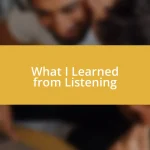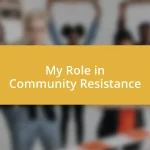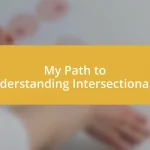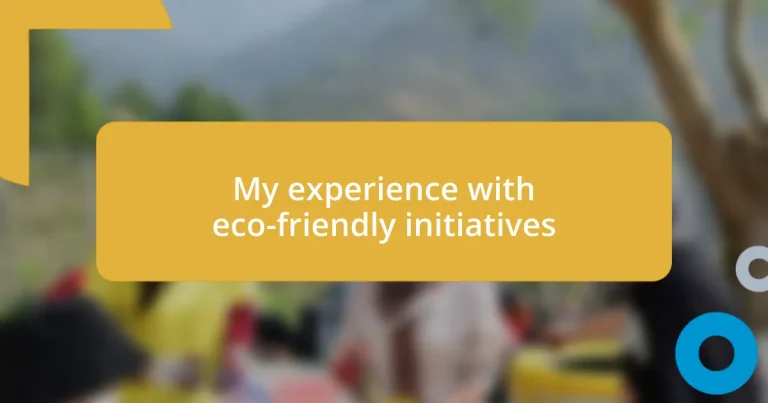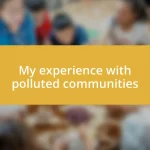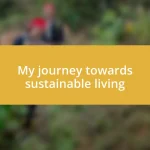Key takeaways:
- Participating in local clean-up events fosters community connection and awareness of individual environmental impact.
- Adopting sustainable practices like composting and second-hand shopping enriches personal fulfillment and promotes creativity.
- Challenges such as adapting to eco-friendly choices and overcoming social skepticism highlight the journey towards sustainability.
- Engaging in community initiatives leads to emotional fulfillment and collective accountability in sustainability efforts.
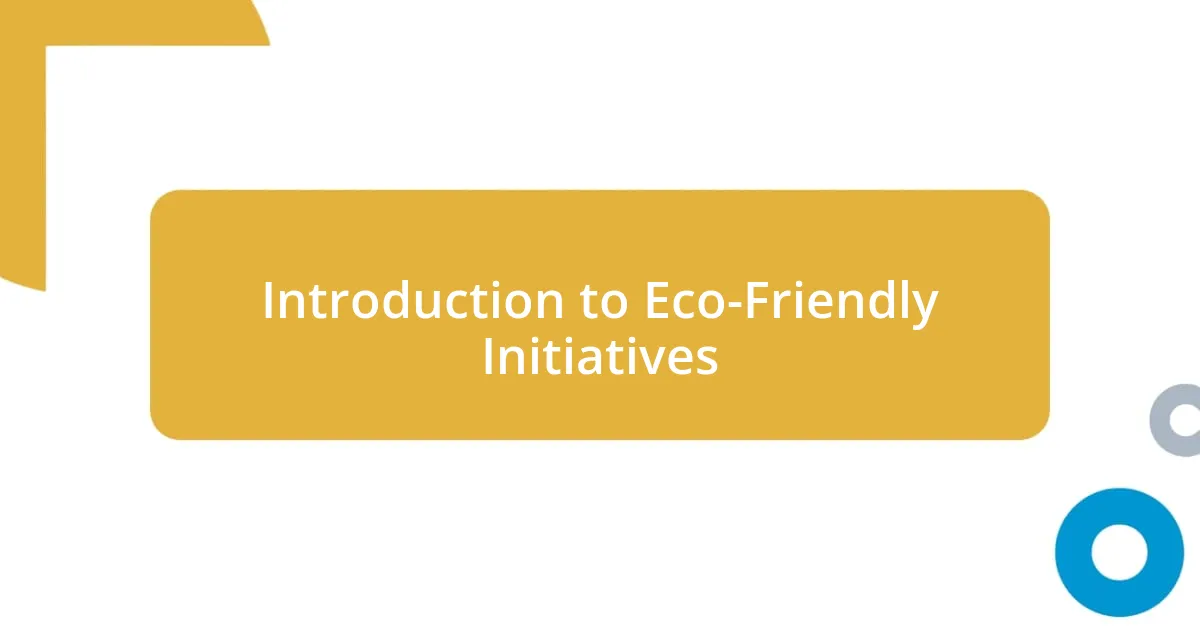
Introduction to Eco-Friendly Initiatives
Eco-friendly initiatives have become increasingly vital in our quest for a sustainable future, reflecting a shift in our collective consciousness. I can fondly remember the first time I participated in a local cleanup event; it wasn’t just about picking up litter, but also about connecting with my community and realizing how our small actions can create ripples of change. What if we all took responsibility for our environment—how would that transform our neighborhoods?
These initiatives encompass a broad range of actions, from recycling programs and conservation efforts to sustainable energy practices. Each step towards eco-friendliness not only benefits our planet but also enhances our quality of life. I recall feeling a sense of pride when I swapped out single-use plastics for reusable alternatives; it was a simple change, yet it felt empowering to contribute to a larger movement.
Moreover, engaging in eco-friendly practices can foster deeper emotional connections with nature. I often find myself reflecting on how my habits impact the Earth and its ecosystems. Have you ever pondered the legacy you’re leaving behind? Embracing eco-friendly initiatives isn’t just about reducing waste; it’s about nurturing our emotional ties to the world around us.
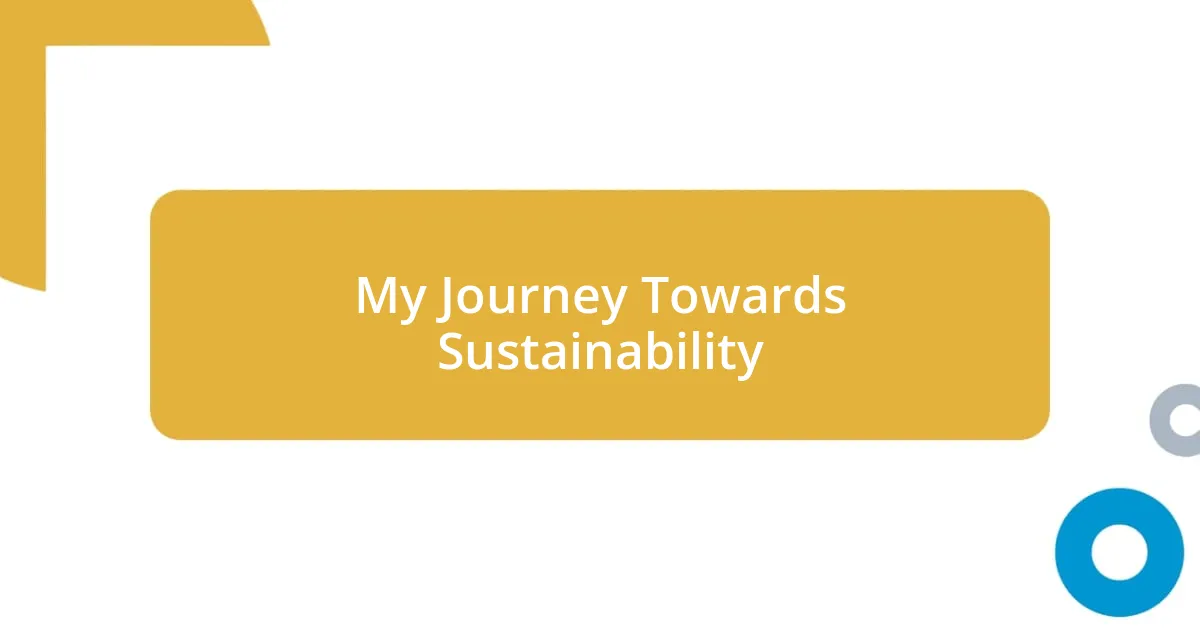
My Journey Towards Sustainability
My journey towards sustainability began unexpectedly while gardening in my backyard. I was digging in the soil when I discovered a hidden layer of plastic buried beneath the surface. It was a stark reminder that every little choice we make—what we throw away or discard—has a lasting impact on the environment. That day, I realized that sustainability isn’t just a buzzword; it’s a personal commitment to protecting our shared home.
As I delved deeper into sustainable practices, I discovered the beauty of composting. I remember the first time I turned my kitchen scraps into nutrient-rich soil. I felt an incredible sense of accomplishment knowing that I was reducing waste while enriching my garden. Composting transformed my gardening experience and sparked a passion for creating cycles of growth rather than depletion.
Exploring sustainable fashion has also reshaped my worldview. I vividly recall attending a clothing swap event where I traded pieces I no longer wore for something new to me. Witnessing the excitement in others as we breathed new life into our wardrobes was uplifting; it cultivated a spirit of community and creativity. I’ve learned that sustainability can be joyful, turning consumer habits into opportunities for connection.
| Aspect | My Experience |
|---|---|
| Gardening | Rediscovered the importance of the soil and how our choices impact it |
| Composting | Transformed organic waste into fertile earth, fostering a personal connection with nature |
| Sustainable Fashion | Participated in clothing swaps, promoting community and creativity instead of consumption |
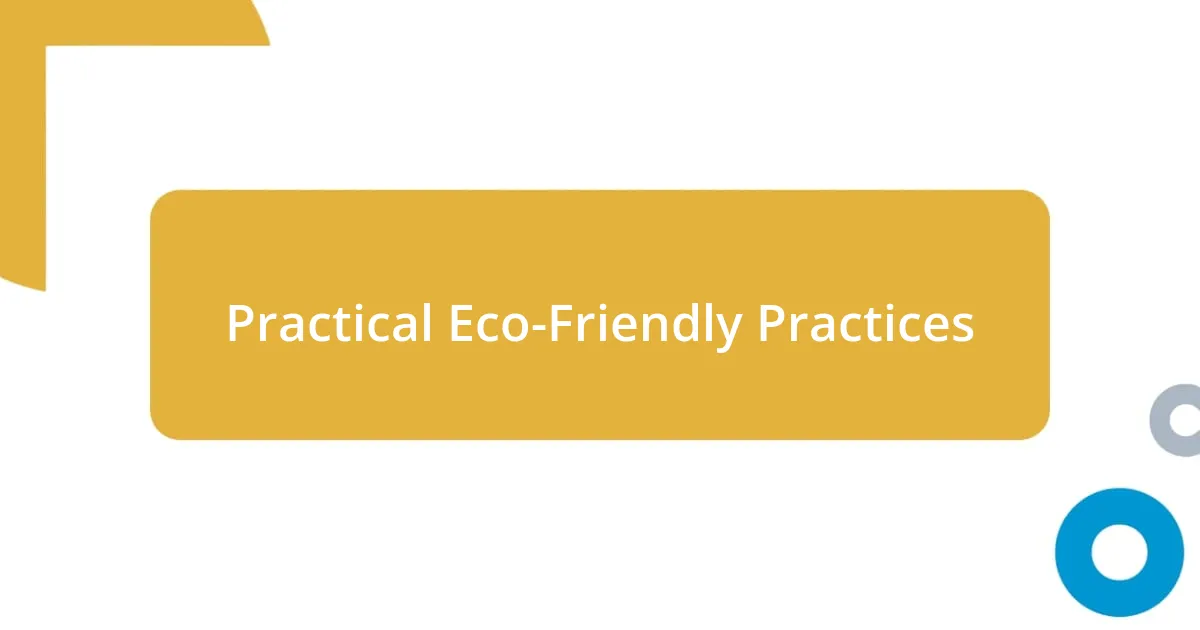
Practical Eco-Friendly Practices
The journey toward eco-friendly practices is often filled with small but meaningful changes that can have a big impact. For me, one significant shift was adopting a zero-waste mindset. I remember the sense of clarity I felt when I realized that my trash could be minimized with thoughtful choices. For instance, investing in a good quality stainless steel water bottle not only cut down on my plastic usage but also transformed how I hydrated throughout the day. It feels empowering to know I’m doing my part, even in this simple way.
Here are some practical eco-friendly practices I’ve embraced:
-
Bulk Buying: I’ve started purchasing grains, nuts, and spices in bulk to reduce packaging waste.
-
DIY Cleaning Products: Mixing simple ingredients like vinegar and baking soda has given me a cost-effective way to keep my home clean without harsh chemicals.
-
Plant-Based Meals: Incorporating more plant-based meals into my diet has not only improved my health but also helped reduce my carbon footprint.
-
Second-Hand Shopping: I now enjoy exploring thrift stores, where I often find unique items while giving pre-loved items a new life.
Embracing these practices has not just been about environmental responsibility; each step has enriched my daily life in unexpected ways. I’ve forged deeper connections with the earth and fostered a sense of community around sustainable living. In a way, it’s like rediscovering joy in the act of consumption, where each choice brings a sprinkle of intentionality to my life.
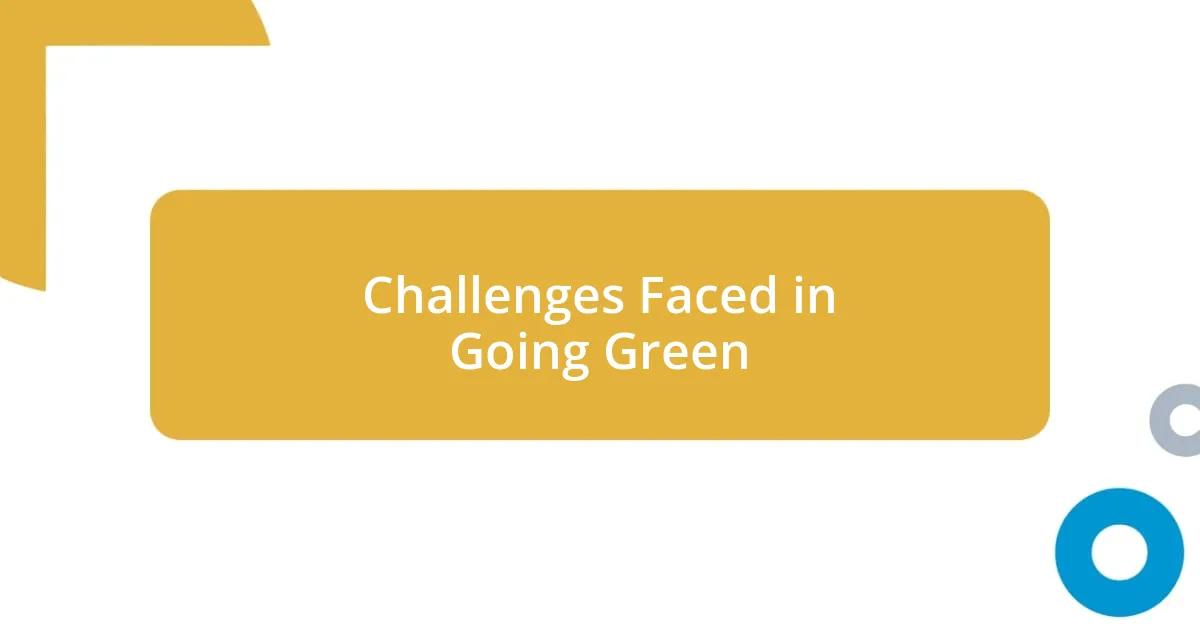
Challenges Faced in Going Green
Going green is a rewarding journey, but let me tell you, it doesn’t come without its hurdles. One of the biggest challenges I faced was the initial overwhelm of information. There are so many eco-friendly alternatives and practices that it can feel paralyzing. I remember standing in the cleaning aisle, trying to decipher which product was truly sustainable. It made me question my choices, and honestly, I felt lost at times.
Another significant hurdle was adapting my lifestyle to be more sustainable without breaking the bank. I recall my first attempt at switching to organic products; my grocery bill skyrocketed! I had to wrestle with the idea that doing good for the planet might also mean spending more. Eventually, I found ways to integrate these changes gradually, focusing on quality over quantity, allowing me to align my values with my budget.
Social pressure can also be a roadblock. When I began sharing my eco-friendly choices, I faced skepticism from friends and family. They would often ask, “Is it really worth it?” At times, I felt defensive about my choices, but I learned to channel that energy into simple conversations that educated rather than confronted. Through dialogue, I could share my own feelings of satisfaction and purpose, hoping to inspire others to consider their own impact on our shared planet.
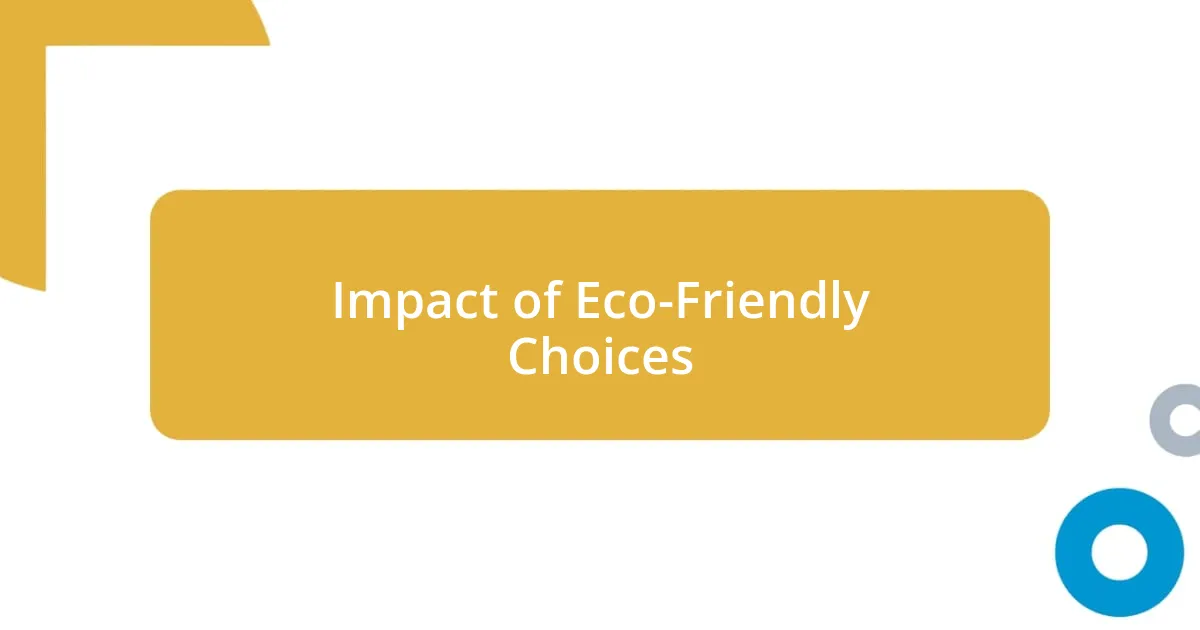
Impact of Eco-Friendly Choices
Making eco-friendly choices has a profound ripple effect—not just on the environment, but on our lives as well. I’ve often found that every small step I take, like using cloth bags for shopping, sparks conversations with others about sustainability. It’s fascinating how sharing my choices leads to connections that deepen our understanding of our collective impact. Have you ever noticed how talking about these issues can inspire a shift in someone’s perspective?
Beyond the immediate environmental benefits, I’ve realized that these choices often bring unexpected emotional rewards. For example, when I started gardening, I didn’t just grow vegetables; I felt a sense of accomplishment and connection to the cycles of nature. The satisfaction of harvesting my own produce is unmatched, and it makes me appreciate food in a way I never did before. Isn’t it amazing how our choices can transform our relationship with what we consume?
Additionally, I’ve observed that eco-friendly actions often promote a sense of community. When I began participating in local clean-up events, I met like-minded individuals who share my passion for the planet. This sense of camaraderie fosters accountability and encouragement, making this journey feel less isolating. What if we all took one step closer to connecting with others on similar journeys? The impact is far-reaching, and I believe it’s essential to highlight how our decisions bond us more deeply—not just with our surroundings, but with one another.
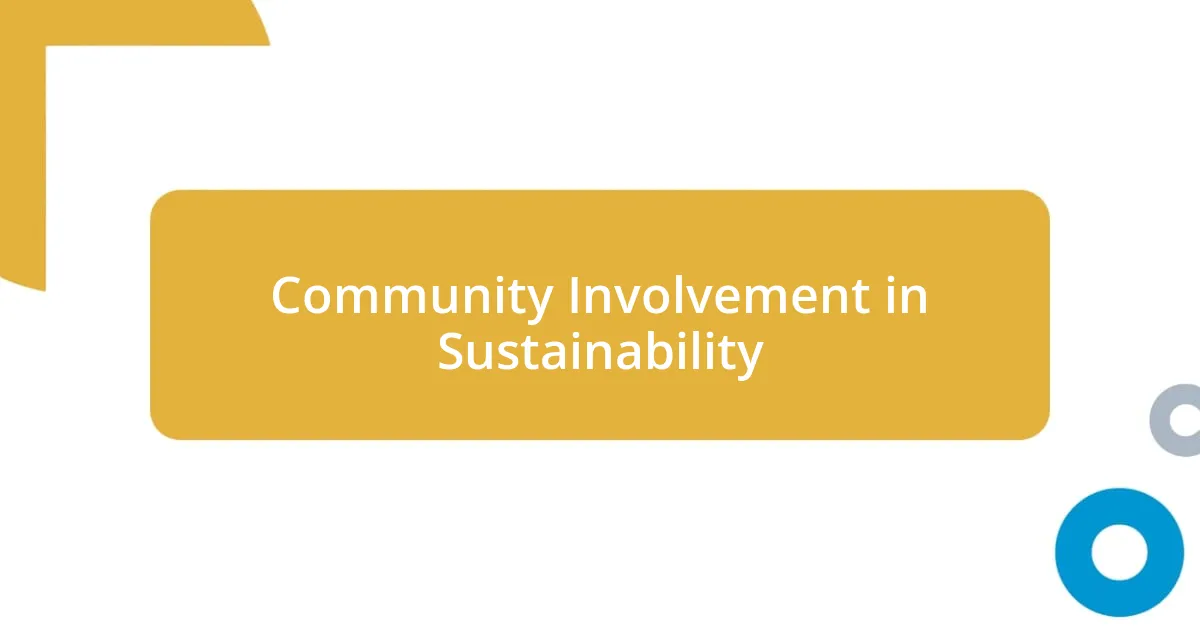
Community Involvement in Sustainability
Joining community initiatives centered around sustainability has truly been a transformative experience for me. One vivid memory that stands out is when I attended a neighborhood workshop on composting. It was eye-opening to see people of all ages come together, equipped with their questions and a genuine curiosity about reducing waste. The energy in the room was infectious, and I left feeling not just more knowledgeable but also more connected to my neighbors. Have you ever felt that surge of community spirit when working toward a common goal?
The emotional benefits of getting involved in sustainable practices have also been significant. Volunteering for tree-planting events has become an annual tradition for me, and each time, I feel a deep sense of fulfillment. Planting a tree that will provide shade and oxygen for years to come instills a sense of hope. It’s a tangible reminder that our actions today can nurture future generations. How often do we get the chance to make such a lasting difference in someone’s life, even if indirectly?
I also cherish the discussions that arise from these community activities. Engaging with diverse viewpoints has broadened my understanding of sustainability. During a recent town hall meeting, people shared their unique challenges and solutions. Listening to others’ stories inspired me to rethink my methods and consider alternative practices I hadn’t previously explored. It’s amazing how a simple conversation can deepen our commitment to sustainability and inspire innovative thinking within the community. Don’t you think that sharing these experiences can be the key to fostering change?
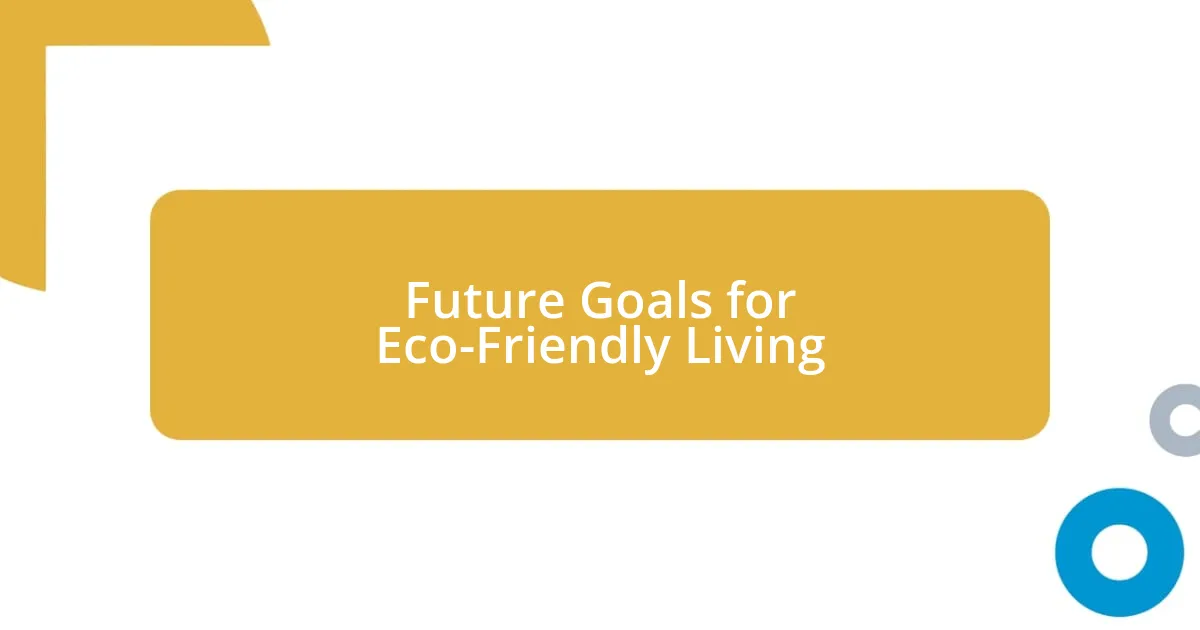
Future Goals for Eco-Friendly Living
Setting goals for eco-friendly living is a crucial part of my journey. Personally, I’ve started aiming for a zero-waste lifestyle. It’s not just about reducing trash; it’s become a fascinating puzzle that challenges me to think creatively about my consumption habits. For instance, I now carefully consider what products I buy and how I can reuse or repurpose them. Have you thought about how many items in your home could have a second life?
One of my future goals is to transition to using renewable energy in my home. I vividly remember sitting in a friend’s backyard, surrounded by solar panels, and feeling inspired by how they harness the sun’s power. The sense of independence from traditional energy sources sparked a fire in me to do the same. I’m actively researching solar options and exploring local incentives. What energy sources are you thinking about embracing to reduce your carbon footprint?
I also want to deepen my involvement in eco-education initiatives. Last month, I volunteered at a local school to teach kids about the importance of recycling. The excitement on their faces as they learned about transforming waste into new products was heartwarming. It reminded me that planting seeds of knowledge in the younger generation can lead to a more sustainable future. How can you contribute to nurturing eco-conscious minds around you?

